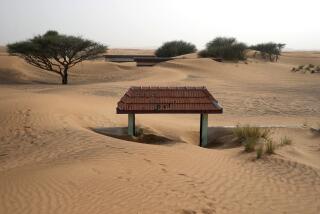Failaka Retains Old World Charm : Persian Gulf Island Is a Popular Resort Despite War
FAILAKA, Kuwait — As Mohammed Ishfaq sees it, he can live with the occasional Iranian missile crashing into his home island of Failaka, where he is curator of the Museum of History.
But if it looks like the Iranians will invade, he says he’ll evacuate and join his brother in New York.
Situated halfway between Iranian missile batteries firing from the Faw peninsula 20 miles to the north and Kuwait 20 miles southward, the tiny island is a popular resort where rich Kuwaitis let their hair down during the long summer months.
Despite the conflict swirling in the Persian Gulf, the island, with its 3,500 or so year-round residents, retains its old world charm. Weather-beaten fishermen painstakingly mend their nets or work at the bamboo fish traps they erect on white sandy beaches.
Tea Amid Missiles
Village elders offer tea and coffee with the courtesy a visitor meets throughout the Arab world. Smiling children wave and shout greetings from battered island buses.
There was a settlement on the island as long ago as the Bronze Age, archeologists have discovered. And tablets dated 325 BC have recorded events on Failaka, which Greek sailors roaming the gulf at the time of Alexander the Great named Iiares, after an island in their home waters.
Since three Silkworm missiles streaked over the island in October--hitting a U.S.-owned oil tanker, an American-flagged tanker and Kuwait’s main sea island oil terminal--Failaka is being militarized.
Kuwaiti troops reportedly have redeployed U.S.-made Hawk missiles on Failaka to try and shoot the Silkworms down.
Tempting Targets
Hundreds of Kuwaiti troops have been sent to camps on the island in recent weeks to beef up defenses, according to island residents. Fierce-looking soldiers wearing leather hats with earflaps race around Failaka in camouflaged trucks.
Some foreign diplomats in Kuwait city believe Failaka and other Kuwaiti islands could make tempting targets for Iran if it launches a widely expected winter offensive to capture the southern Iraqi port city of Basra.
Grizzled soldiers, carrying packets of tea to keep them warm during night watches, share the half-hour ferry ride from Ras Al Ard on the mainland with tourists booked at the island’s luxury chalet complex.
A few hundred yards off Failaka, a missile pokes out of a camouflaged truck perched on a desert cay.
The Kuwaiti defense ministry said Tuesday it is negotiating with British, French, Soviet and U.S. manufacturers to purchase a more appropriate anti-missile system to down low-flying Silkworms fired from Faw.
Dim Prospect
To Ishfaq, sitting inside the mud walls of his museum, a replica of a 19th-Century island fisherman’s home, the prospect of sophisticated missile defenses meant only more of the war that has been raging between Iran and Iraq, Kuwait’s ally, for more than seven years.
“It was very noisy,” Ishfaq said, recalling the January day an Iranian-fired Silkworm missile crashed near Failaka island’s television relay station.
“Sand fell out of the roof,” he said. “Women and children were crying.”
Ishfaq allowed that he isn’t much tempted to swap working on his collection of antique furniture, model boats and pearl divers’ gear for the bustle of city life, not even to join his adventurous brother Tariq, who works as a waiter in Brooklyn.
“If the Iranians come,” Ishfaq says, beaming out from his white desert robes, “I will go to New York.”
More to Read
Sign up for Essential California
The most important California stories and recommendations in your inbox every morning.
You may occasionally receive promotional content from the Los Angeles Times.










